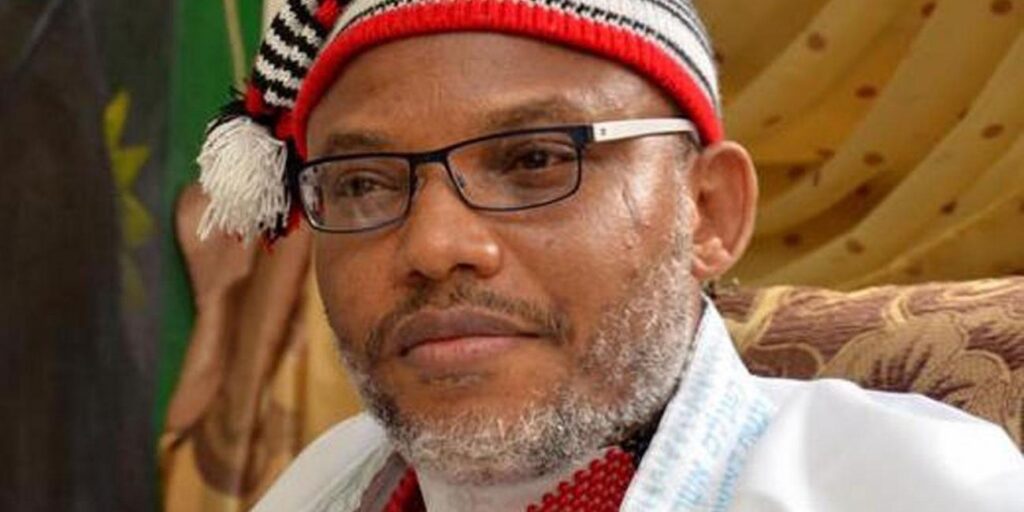
The legal team representing Nnamdi Kanu, leader of the Indigenous People of Biafra (IPOB), has condemned the continuation of his trial without reinstating his revoked bail, calling the move unconstitutional.
Led by Barrister Aloy Ejimakor, Kanu’s legal team revisited the nine-year-long legal battle that began with his arrest in Lagos on October 14, 2015, shortly after his arrival from London. They emphasized that the charges against Kanu primarily stemmed from his broadcasts on Radio Biafra, which was operated from the UK.
During a press conference in Abuja on Thursday, Ejimakor stated, “Imagine enduring nearly a decade of endless trials that rarely progress, combined with detention without conviction—18 months between 2015 and 2017, and over three and a half years since 2021. This is an unprecedented injustice.”
The team recounted that after Kanu was granted bail, his home was attacked by the Nigerian Army in September 2017, leading to significant casualties, including his parents, who later died from injuries and trauma related to the invasion. A high court subsequently declared the attacks unconstitutional and awarded damages to Kanu.
In March 2018, an African tribunal also condemned the military action and the proscription of IPOB, labeling the proscription discriminatory and unconstitutional. The United Nations similarly criticized the move, citing ethnic discrimination against the Igbo.
Kanu was abducted in Kenya in June 2021 and unlawfully extradited to Nigeria, a process condemned by two UN human rights bodies, the Federal High Court, and the Nigerian Supreme Court. Despite a court ruling that his detention was unconstitutional and awarding him damages, Kanu remains in custody.
On June 29, 2021, after being renditioned, Kanu was presented in court without his legal counsel. This led to a remand order by the Federal High Court, violating constitutional provisions such as Sections 36(3), 36(4)(a), and 36(6)(c). The hearing also breached Section 169 of the Administration of Criminal Justice Act, 2015.
In October 2022, the Court of Appeal discharged Kanu of all charges. However, within two weeks, a different panel of the same court stayed the execution of its judgment, effectively reversing its decision. Ejimakor remarked, “The Federal Government blatantly disobeyed the initial judgment, and the subsequent stay of execution was used to justify their illegal actions. This is both absurd and unconstitutional.”
The legal team argued that Kanu’s bail must be reinstated before any trial can proceed. They cited a December 2023 Supreme Court ruling (SC/1361/2022), which criticized the Federal Government for misleading the trial court into revoking Kanu’s bail. The ruling noted that Kanu’s absence was due to the military’s invasion of his home, not an attempt to evade justice.
“Those who claim the Supreme Court remitted Kanu’s case for trial conveniently ignore that the same judgment also invalidated the bail revocation. The impartiality of the Federal High Court in revoking Kanu’s bail was questioned by the Supreme Court itself,” Ejimakor added.
The team highlighted concerns over Kanu’s detention at the Department of State Services (DSS) facility, alleging interference with his defense preparation, restricted access to lawyers, and secret monitoring of consultations.
They also criticized recent moves to reassign Kanu’s case to a judge previously recused by court order, describing it as unconstitutional.
“The Federal Government and the High Court cannot cherry-pick which parts of the Supreme Court judgment to obey. If the trial must proceed, then his bail must also be reinstated,” the team asserted.
The lawyers concluded by stating that Kanu’s ordeal has shifted from a legal battle to a political vendetta. “This case, devoid of merit, has become a trial by ordeal, not by the Constitution. Such perversion of justice will not stand.”
For updates, join our WhatsApp channel: Chronicles Reporters.